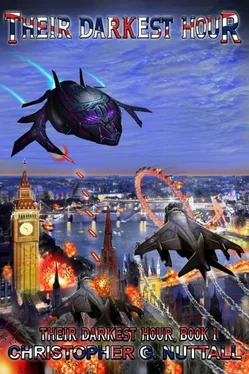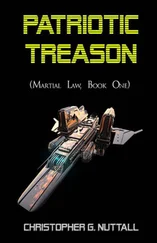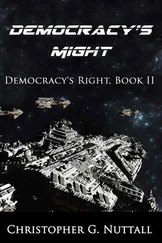But the country was bleeding too. The BBC was heavily censored these days, controlled by the collaborator government, but enough was leaking through to worry Gabriel. People were starving, families had been shattered… each disaster might have been tiny, on a planetary scale, but they added up to untold misery. Britain wasn’t supposed to be like that, he told himself, even during the Blitz they’d been spared the suffering inflicted on continental Europe by the Nazis. Britons saw disasters on television and donated money to help the dispossessed. They didn’t suffer disasters themselves. He’d once read a book where an extinct volcano in Edinburgh had come back to life, forcing British emergency services to cope with the disaster. They hadn’t done a very good job.
He sat back in his chair, trying to think. How could they convince the aliens to leave? But the aliens only seemed to respect force — and the entire human race hadn’t been able to convince them to back off. Barely a month ago, the United States had been so far ahead of the rest of the world that it could do almost anything it liked. It was now invaded and occupied, the massive aircraft carriers that had given the Royal Navy fits of envy sunk by rocks dropped from orbit. Russia and China had been crushed, the Chinese suffering the effects of their own nuclear weapons as well as alien KEW strikes. And Europe…
The latest reports, such as they were, suggested that Europe was suffering from famine. France and Germany, the two powerhouses of the European Union, had been crippled, the continent-wide distribution network for food breaking down under the pressure of the alien offensive. Eastern Europe had attracted less attention from the aliens, with the result that millions of refugees were thronging through the countryside, desperately seeking a safety that no longer existed. The war in Bosnia had restarted, with a dozen different groups trying to exterminate their enemies before the aliens decided to intervene. But why would the aliens bother to intervene? Their human enemies were killing themselves off nicely.
And all he could do was sit and watch as his country was taken apart. He stared around the library, at the old books lovingly collected by the library’s owner, and cursed himself for his weakness. His position as Prime Minister was meaningless in all, but name. Even if he were to issue orders, it was uncertain how many people would even hear them, let alone obey. The resistance seemed to be held together very loosely, if at all. He’d been assured that it was the only way to prevent the aliens from uncovering them all if they captured men from one particular cell, but it still felt flimsy to him. How long would it be before the resistance became nothing more than bandits?
A month. That was all it had been — and it felt as if he had been cooped up in his gilded cage forever. He thought, briefly, about the soldiers on the outside, providing security for his august person… did they feel resentment or relief that they were out of the fight? And how long would they stay out of the fight? The collaborators had offered a hefty reward for anyone who brought them Gabriel’s head, preferably not attached to his body. He wasn’t blind to the advantages the aliens would gain from having the legitimate Prime Minister as a collaborator, although he suspected that they wouldn’t find him as useful as they would have expected. The slaughter in London would have destroyed whatever legitimacy the collaborator government had once enjoyed.
But what could they do ? The aliens held control over the high orbitals — if worst came to worst, they could pull out of London — or any other city — and drop rocks on it from orbit. He thrilled to the stories of ambushes and IEDs planted in positions where the aliens would run over them, but they could never force the aliens to retreat and abandon Earth. And what would happen if the aliens decided to simply exterminate the human race altogether?
Alone in the library, Gabriel continued to worry. He wanted to do something, to take a stand, but what could he do? His only contribution to the resistance was a second video, one condemning the aliens for the slaughter in London and calling on all loyal British citizens to join the fight. And how many of them would hear him and die because they’d listened to a Prime Minister skulking in a hole?
But what else could he do?
* * *
“There’s a great deal about this we don’t understand,” Linux said. Brigadier Gavin Lightbridge-Stewart — who was, as far as he knew, the senior surviving British military officer — nodded. Computers might have been extremely useful, but he didn’t pretend to understand what went on inside them. “But the alien computer network is actually surprisingly primitive.”
Gavin gave him what he hoped was an encouraging look. Linux — and his friends — hadn’t joined the army in the traditional manner, let alone worked their way through the Combat Infantryman’s Course at Catterick. They’d been computer hackers who’d gotten their kicks by breaking into secure databases, at least until they’d been caught and offered a blunt choice between working for the government or spending a number of years in jail. They did have some sense of social responsibility, yet they had no sense at all of military etiquette. It was sometimes refreshing to chat to them, but not now. The entire country was under enemy occupation.
“It seemed so odd that we were convinced they were screwing with our minds,” Linux continued, cheerfully. “They can travel faster-than-light, their starships are several kilometres long and they clearly have at least some form of antigravity system — their shuttles couldn’t fly without something along those lines. And yet they are oddly primitive in some areas. Their precision weapons aren’t very precise and their computer networks are surprisingly crude.”
Gavin nodded, although he had his own theories about alien precision weapons. From what they could see, the aliens seemed less inclined to worry about accidentally hitting their own troopers as well as enemy positions — and they showed a frightening lack of concern for civilian casualties. If they hadn’t had the political impetus to design smarter and smarter weapons, maybe they simply hadn’t bothered. Besides, the aliens didn’t seem to bother with inventing justifications for their invasion of Earth. They’d come, they’d seen — and they’d invaded.
“They do have wireless networks comparable to our own, but their security technology is several generations behind ours,” Linux continued. Two SAS men had slipped close to a major alien base to establish a passive listening post linked directly to the resistance’s computer geek headquarters. They’d been monitoring alien traffic ever since. “One thing we can confirm is that the aliens are definitely top-down commanders. Orders flow down from the starships or the command base in London and the poor grunts on the ground do as they’re told.”
He grinned. “It took a week to find a way to slip into their networks, but we’re finally starting to pull files out from their systems for examination elsewhere,” he added. “We stumbled across another puzzle almost at once. Our translation software isn’t very good, but theirs seems to be better than ours — even though their computers are less capable. But it isn’t as good as it could be.”
Gavin frowned, considering the puzzle. The aliens hadn’t done much with the civilian population, but one thing they had done was take over a number of computer-related colleges and research labs. If the alien computers were primitive, maybe they were intent on absorbing human technology into their own society. But why were they primitive in the first place? Gavin could accept that they wouldn’t be so concerned with producing precision weapons, yet why didn’t they have superior computers? They certainly should have possessed computers equal to mankind’s best designs.
Читать дальше












